[ad_1]
Toyota’s large van is on track to be launched next year making it one of only a few manufacturers to offer a van in all of the major size categories as well as a pick-up truck and a car-derived van.
While there are few details on what the van will offer at this stage, Toyota has confirmed that there will be an electric version.
Gareth Matthews (pictured), LCV manager at Toyota, says the addition of a large van to its commercial vehicle line-up will be the “final piece in the jigsaw”.
“It means that we can speak to a fleet customer and give them a complete proposition. That’s key for us.”
Toyota announced earlier this year that it will launch a large van in 2024, as part of an expanded partnership with Stellantis.
The new van marks Toyota’s first entry into the larger-sized commercial vehicle segment.
It will join Toyota’s existing Stellantis-derived Proace City and Proace models, enabling Toyota to offer a full LCV line-up in Europe.
“Before the end of this year, we’ll also be undertaking a big level of integration of new LCV content into our technician training programme,” says Matthews.
“We’ve increased it steadily since 2016, with the view to improving diagnostic capability and minimising the time vehicles are off-road.”
Commercial vehicle focus
Matthews joined the manufacturer as its first dedicated LCV manager in 2016, as it geared up for the launch of eighth generation Hilux and second generation Proace.
With a greater influence over research and development of the platform it shares with PSA Peugeot Citroën (now Stellantis) for those vehicles, Matthews says that was a “line in the sand” for Toyota, it was back in LCV.
He explains: “I was brought in with an LCV background to focus on working with all parts of our business, to make sure that we were applying the right levels of focus and doing the right things.”
To support that new product and enhance its LCV credentials, a network of 25 LCV dealers was opened, complete with product specialists who had been trained by the business.
That was followed by the launch of Toyota’s first authorised converter programme in the UK, which was also its first in Europe.
New product quickly followed with the launch of Land Cruiser Commercial in 2018 and Proace City in 2019.
The Toyota Professional brand was launched the following year, while its LCV specialist network was increased to 140.
The Corolla Commercial followed and, with Toyota due to enter the large van market next year, Matthews says that will not only give it a vehicle in every segment of the market, but also a drivetrain to suit all needs.
“Now with (new van) supply normalising and with this full range of product, we have to kick it on,” he explains.
“We need to ensure we’ve got the right level of focus in our network; we’ve got to ensure that we’ve got the right branding, so people recognise our brand. We’ve got to make sure we’ve got the right customer proposition.
“In other words, what’s important to an LCV customer, are we meeting those needs in the workshop and are we meeting them in the in the showroom?”
Today the LCV network is 146-strong and Toyota is currently carrying out an audit to understand its capabilities for the service, maintenance and repair (SMR) of its new large van next year.
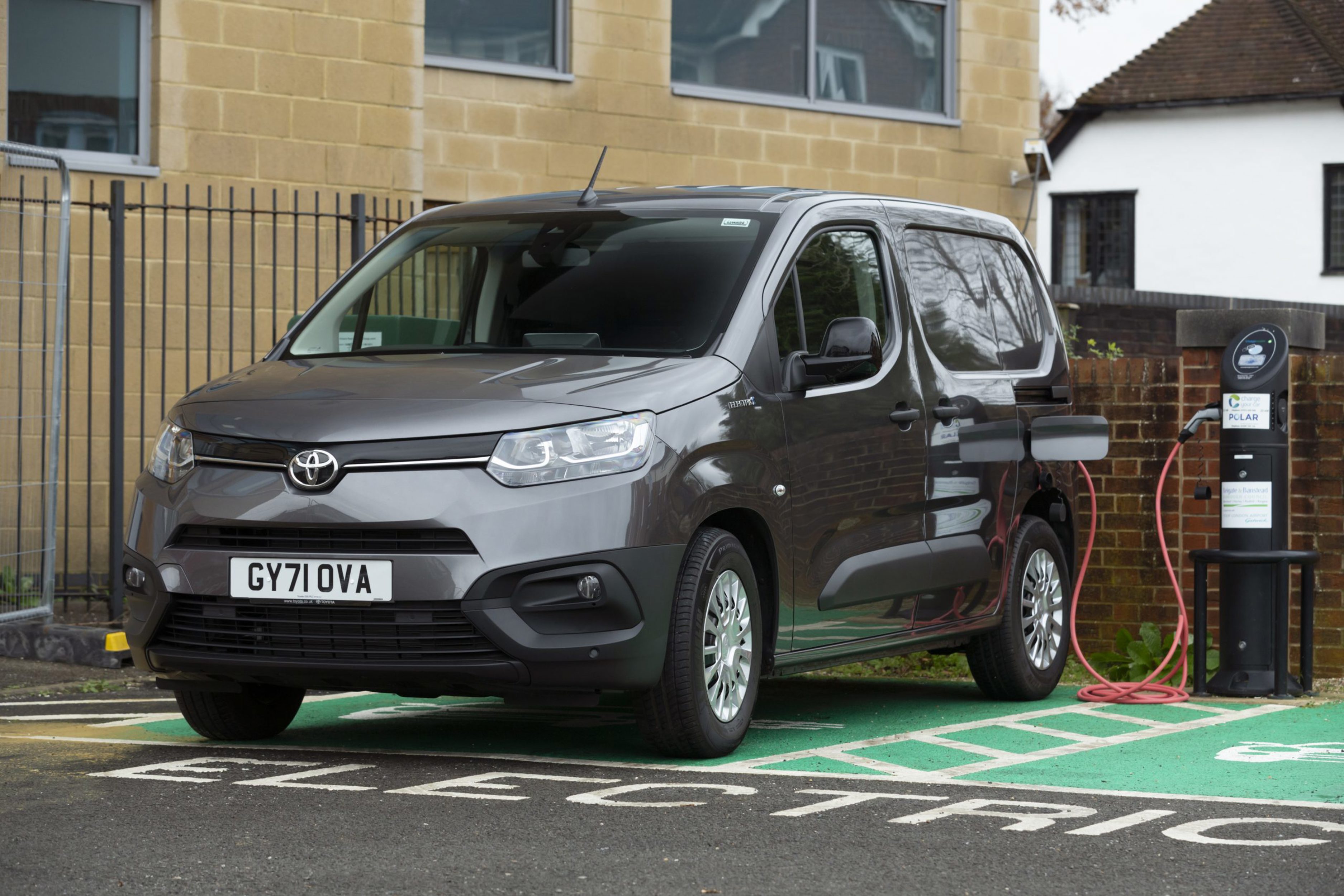
Lead times
Like many manufacturers, Toyota has seen supply chains squeezed due to the semiconductor shortage and the war in Ukraine.
However, Matthews says that the situation has improved, which has been illustrated by recent sales figures from the manufacturer.
Year-to-date, it has sold 10,146 commercial vehicles, a massive 27.4% increase over the same period last year. It has also increased market share from 4.88% to 5.15%.
“At the moment, what we’re finding is that there are still pockets of component shortages, but at very, very short notice,” explains Matthews.
“It’s really hard to call, you might be looking at a supply outlook today which looks healthy and then all of a sudden, there’s a shortage of componentry and you pushed back a month or two in production.”
However, he says: “It’s not happening as frequently as it has been. It’s getting way better. At the moment, our lead times are much more realistic than they have been for quite a long time.”
Lead times, on average, are now around the 4-6-month mark, but Matthews stresses that is subject to change, but its network is updated on a weekly basis so customers can be kept informed.
Powertrain choice
With a choice of internal combustion engine (ICE), hybrid and electric commercial vehicles, Matthews says the vast majority of fleets are still sourcing diesel vans.
More fleets are considering electric and there is a shift in volume mix away from diesel to zero emission vehicles, according to Matthews. However, as the latest figures for light commercial vehicle (LCV) registrations show, diesel remains the dominant powertrain.
The data, published by the Society of Motor Manufacturers and Traders (SMMT), reveals market share for diesel has grown marginally year-to-date, from 92.3% to 92.5%, while new battery electric vans has fallen, from 5.4% to 5.2%.
“We’re seeing the uptake (of electric vans) mostly from the larger corporate fleets,” says Matthews, while the Corolla Commercial has provided fleets with a hybrid option where BEVs don’t work.
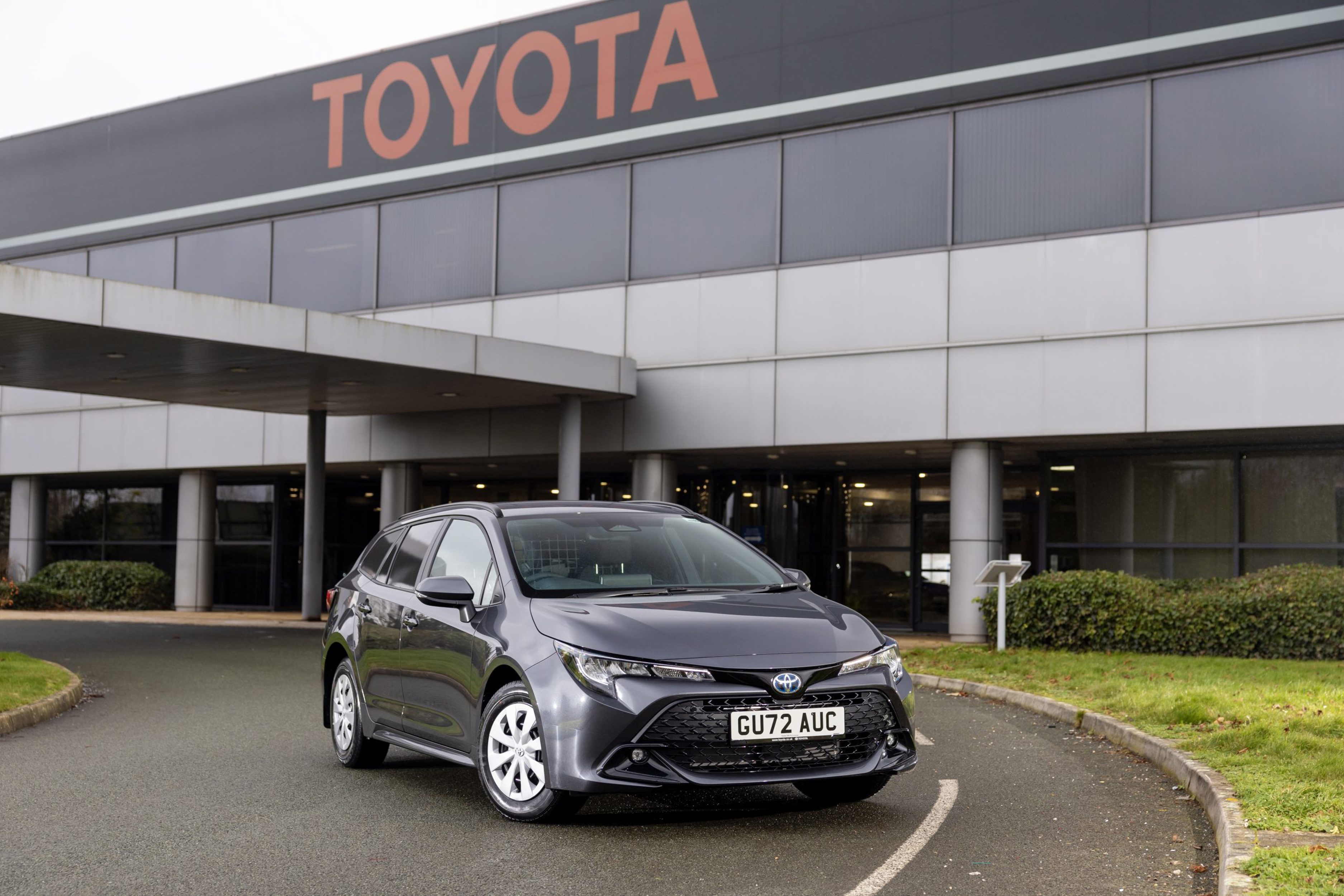
Built in Britain at Toyota’s Burnaston plant, the recently updated Corolla van (see above) uses the same 1.8-litre petrol hybrid engine as the Corolla passenger car.
Total power from the engine is 140PS, bringing a 1.7-second reduction in the 0-62mph time to 9.4 seconds on its predecessor. CO2 emissions are from 100g/km, with fuel economy from 64.2mpg (all figures WLTP combined cycle).
Matthews explains: “We are very much about providing the customer with the right drivetrain, and the right mobility solution to fit their needs, rather than just having one offering and hoping we can shoehorn everybody into the same thing.”
Land Cruiser Commercial
Along with its large new van launch next year, Toyota will also be unveiling the latest Land Cruiser Commercial.
The passenger car version was revealed last week (see below), sporting retro styling inspired by Toyota’s historic Land Cruiser models and follows a trend set by the Land Rover Defender – a key rival.
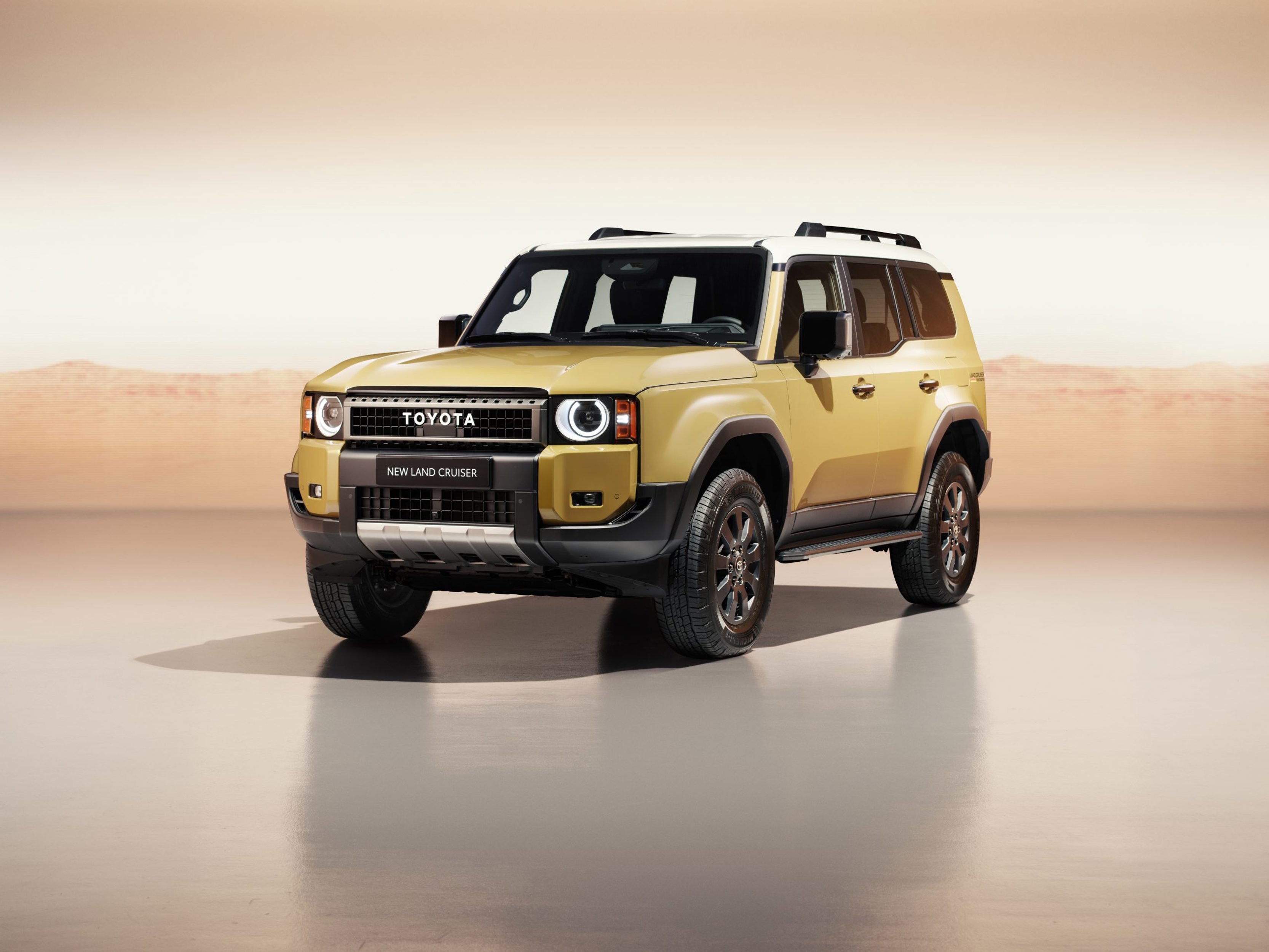
In the UK, the new Land Cruiser will be introduced with a 2.8-litre turbodiesel engine with 204PS and a new eight-speed automatic transmission. It will have a towing capability of up to 3,500kg.
A 48-Volt mild hybrid diesel will be available in early 2025.
Hydrogen-powered Hilux pick-up
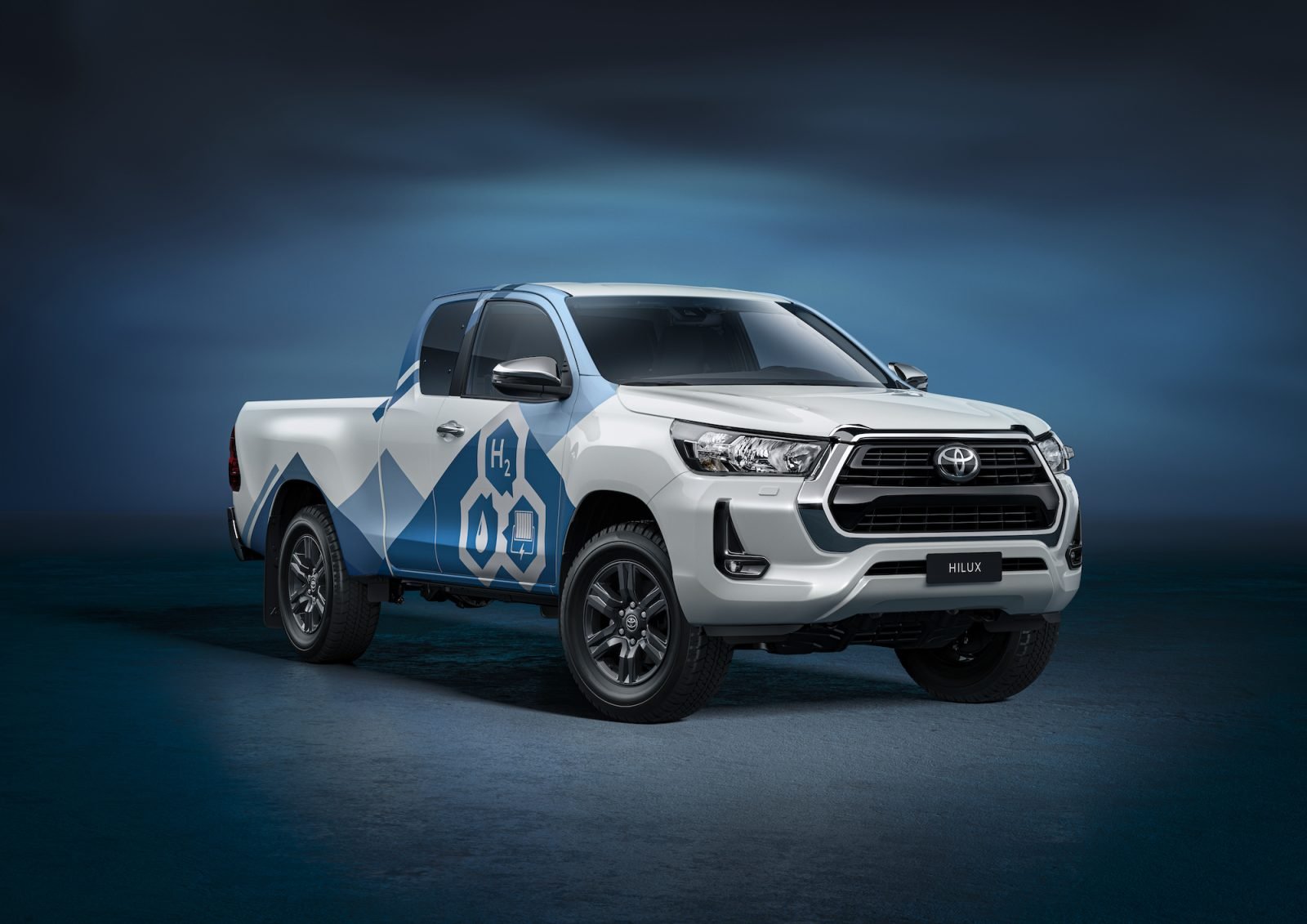
Having already developed a hydrogen car, the Toyota Mirai, the manufacturer revealed late last year it is also developing a hydrogen-powered Hilux pick-up using funds secured via the UK Government’s Advance Propulsion Centre (APC).
A prototype vehicle, based on the existing Hilux, will be engineered at the company’s Burnaston plant, in collaboration with Ricardo, ETL, D2H and Thatcham Research.
The project will make use of components from Toyota’s second-generation fuel cell system, as featured in the latest Mirai, to transform a Hilux into an electric vehicle.
TMUK will lead the project, while Toyota Motor Europe (TME) R&D will provide technical support to help the UK-based teams to build their expertise and become self-sufficient in developing next generation hydrogen drivetrain technologies.
Within the scope of the funding bid, initial prototype Hilux vehicles will be produced at Burnaston during 2023. Once successful performance results have been secured, the intention is to prepare the vehicle for small series production.
Matthews says the team has spoken to a number of key fleet customers to get their feedback ahead of the project.
Award-winning vehicles
A market leading warranty of up to 10 years and the quality of the Toyota Professional network for light commercials has proved key in securing awards for the Proace City and Proace vans.
The Proace City and Proace vans were winners of the Best Small Van and Best Medium Van categories in this year’s Fleet News Awards.
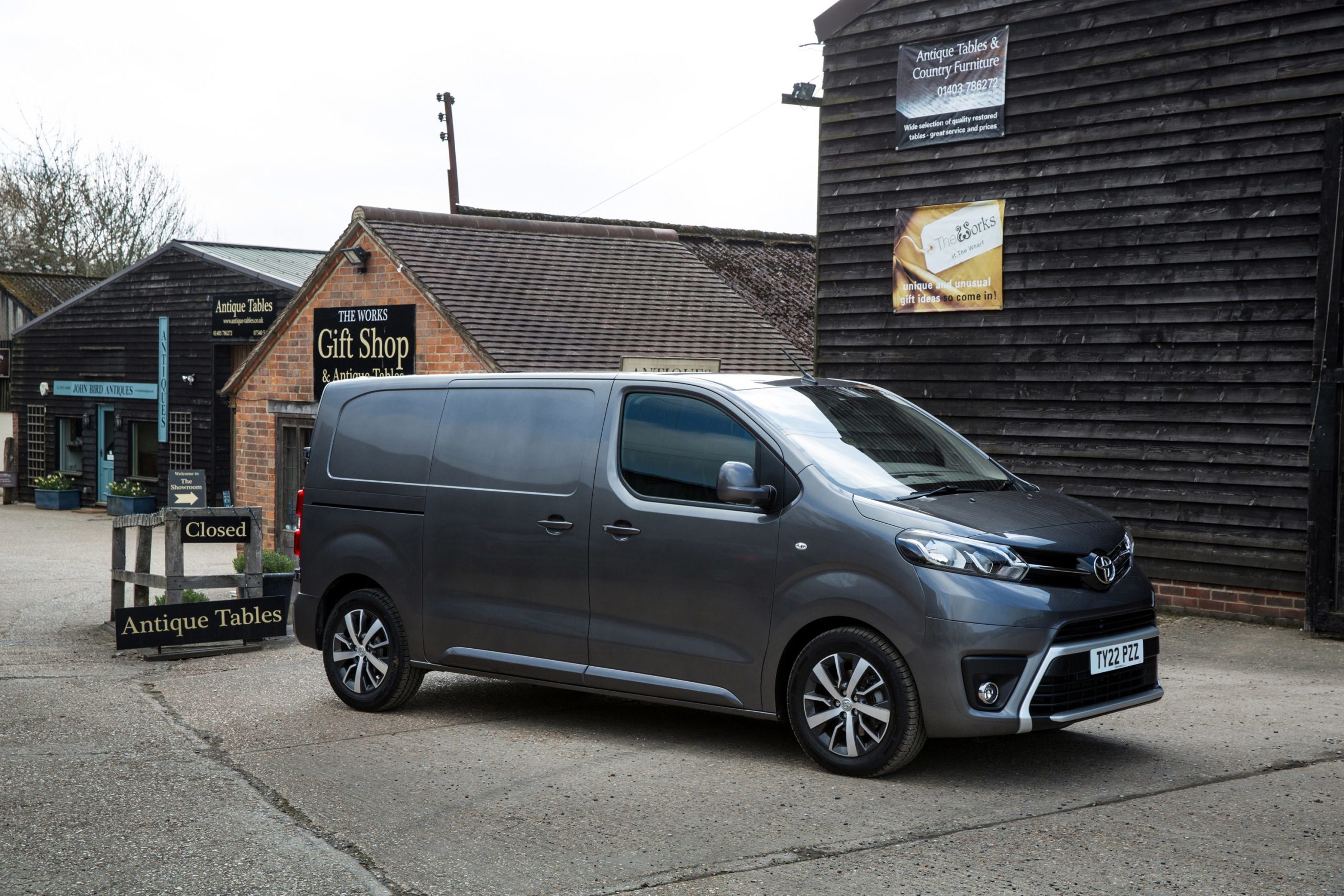
Proace City, Proace and all other Toyota models – light commercial and passenger vehicles alike – qualify for warranty cover for up to 10 years or 100,000 miles – whichever comes first.
This comprises an initial three-year manufacturer warranty, followed by up to a further seven years of service-activated warranty.
For the first three years of the vehicle’s life, owners can have it serviced at a place of their choice. When the new car warranty period expires, they can then benefit from an additional 12 months (or 10,000 miles) warranty when their vehicle has a qualifying service at an authorised Toyota workshop.
The warranty is provided at no extra cost, up to a limit of 10 years/100,000 miles.
In common with all other Toyota Professional light commercial vehicles, Proace City and Proace models also come with five years’ free roadside assistance.
Fleet News Awards best medium van – Toyota Proace
JUDGES’ COMMENTS: An extensive list of options and a 10-year warranty is helping the Proace to break into both the SME and corporate fleet sectors. This high-quality van is giving Toyota the momentum to become a major fleet player in the van sector.
Fleet News Awards best small van – Toyota Proace City
JUDGES’ COMMENTS: High specification levels which prioritise driver comfort and safety plus an excellent extended warranty offering help to differentiate the Proace City from its stablemates, making it a clear winner in the small van category. Judges praised the CV-focused retail network and said Toyota is providing a superb front-and back-end service for fleets.
[ad_2]
Source link
